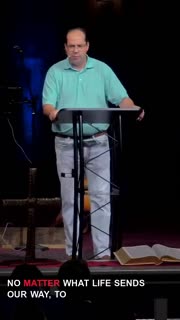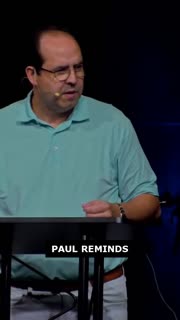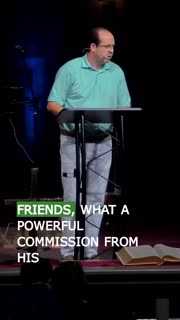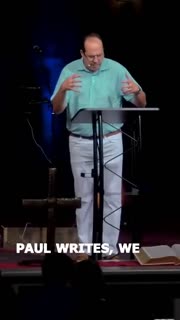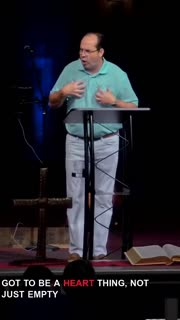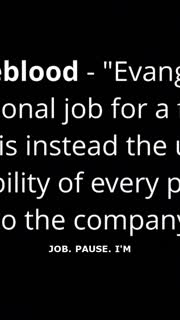Faith, Forgiveness, and the Call to Evangelize
Summary
### Summary
Today, we delved into Romans 10, focusing on the Israelites' struggle with faith and the law. Paul grieves over their misplaced faith in the law rather than in Jesus Christ. He emphasizes that true righteousness and salvation come through a heartfelt relationship with Jesus, not through the law. We explored the story of Gunnar Payne, who, despite personal tragedy, demonstrated profound forgiveness and led others to Christ, illustrating the transformative power of God's love. Similarly, John and Carol Wimber's ministry significantly impacted contemporary worship and evangelism, showing how one person's faith can ripple out to affect many.
Paul's message is clear: salvation is available to all who declare Jesus as Lord and believe in their hearts. This belief must be genuine, not just empty words. We are reminded that our faith should be lived out daily, striving to follow Jesus' teachings and expand God's kingdom. Paul also stresses the importance of sharing the good news. We are all called to evangelize, not just pastors or church leaders. This calling is a responsibility for every believer, to share what Jesus has done in our lives and to bring others to faith.
Reflecting on personal stories, like Rick Warren's father's dying wish to "get one more for Jesus," we are encouraged to take our evangelistic mission seriously. We must focus on the essential task of spreading the gospel, rather than getting caught up in non-essential debates. The ultimate goal is to ensure that everyone has the opportunity to hear and respond to the good news of Jesus Christ.
### Key Takeaways
1. Heartfelt Faith Over Empty Words: True faith in Jesus Christ goes beyond mere verbal declaration. It requires a heartfelt belief and a personal relationship with Him. This genuine faith transforms our lives and aligns our actions with God's will. [36:53]
2. The Power of Forgiveness: The story of Gunnar Payne illustrates the profound impact of forgiveness. Despite his personal tragedy, Gunnar chose to forgive and minister to the man who caused his pain, leading him to Christ. This act of grace shows how God can turn evil into good. [30:22]
3. Evangelism is Everyone's Responsibility: Sharing the gospel is not just the job of pastors or church leaders. Every believer is called to evangelize and share their personal testimony of what Jesus has done in their lives. This personal witness is powerful and essential for spreading the faith. [52:05]
4. Focus on the Essential: We must prioritize the core message of the gospel—salvation through Jesus Christ—over non-essential debates. Our primary mission is to share the good news and bring others to faith, ensuring that everyone has the opportunity to hear about Jesus. [56:19]
5. Legacy of Faith: Reflecting on those who have brought us to faith, like Rick Warren's father, we are reminded of the importance of leaving a legacy of faith. Our actions and words can have a lasting impact on others, encouraging them to follow Jesus and continue the mission of evangelism. [53:59]
### YouTube Chapters
[0:00] - Welcome
[27:04] - Introduction and Prayer
[27:54] - Story of Gunnar Payne
[30:22] - The Power of Forgiveness
[32:37] - Paul's Grief Over Israel
[35:07] - Misplaced Faith in the Law
[36:53] - Heartfelt Faith Over Empty Words
[38:28] - Striving to Follow Jesus
[40:09] - Jesus' Warning in Matthew 7
[42:18] - Believing in Jesus
[44:58] - No Difference Between Jew and Gentile
[46:54] - Everyone Who Calls on the Lord
[48:09] - The Importance of Evangelism
[50:55] - Our Responsibility to Share the Good News
[53:59] - Legacy of Faith
[56:19] - Focus on the Essential
[59:46] - Rick Warren's Father's Story
[01:04:14] - Invitation and Prayer
Study Guide
### Bible Study Discussion Guide
#### Bible Reading
1. Romans 10:9-13
2. Matthew 7:21-23
#### Observation Questions
1. According to Romans 10:9, what two actions are necessary for salvation?
2. In the sermon, what personal story was shared to illustrate the power of forgiveness? ([30:22])
3. What does Paul express as his heart's desire for the Israelites in Romans 10:1? ([35:07])
4. How does Jesus describe those who will enter the kingdom of heaven in Matthew 7:21-23?
#### Interpretation Questions
1. What does it mean to declare Jesus as Lord with your mouth and believe in your heart? How do these two actions complement each other? ([36:53])
2. How does the story of Gunnar Payne illustrate the transformative power of genuine faith and forgiveness? ([30:22])
3. Why does Paul emphasize the importance of sharing the good news with others? How does this relate to the concept of evangelism being everyone's responsibility? ([52:05])
4. What does Jesus' warning in Matthew 7:21-23 teach us about the difference between genuine faith and empty words? ([40:09])
#### Application Questions
1. Reflect on your own faith journey. Have there been times when your declaration of faith felt more like empty words rather than a heartfelt belief? How can you deepen your relationship with Jesus to ensure it is genuine? ([36:53])
2. Think about a person in your life who has wronged you. How can you take steps towards forgiveness, inspired by Gunnar Payne's story? What might be the impact of such forgiveness on both you and the other person? ([30:22])
3. Evangelism is described as everyone's responsibility. Identify one person in your life who does not know Jesus. What specific steps can you take this week to share your faith with them? ([52:05])
4. Reflect on the non-essential debates that can distract from the core message of the gospel. Are there any such debates in your life or church community? How can you refocus on the essential task of spreading the gospel? ([56:19])
5. Consider the legacy of faith you are building. What actions can you take to ensure that your faith positively impacts those around you, similar to Rick Warren's father's dying wish to "get one more for Jesus"? ([59:46])
6. Jesus warns that not everyone who says "Lord, Lord" will enter the kingdom of heaven. How can you ensure that your faith is not just a verbal declaration but a true reflection of your heart and actions? ([40:09])
7. How can you incorporate daily worship and heartfelt prayer into your routine to strengthen your relationship with Jesus and live out your faith more authentically? ([47:32])
Devotional
Day 1: Heartfelt Faith Over Empty Words
True faith in Jesus Christ goes beyond mere verbal declaration. It requires a heartfelt belief and a personal relationship with Him. This genuine faith transforms our lives and aligns our actions with God's will. Paul emphasizes that salvation is available to all who declare Jesus as Lord and believe in their hearts. This belief must be genuine, not just empty words. We are reminded that our faith should be lived out daily, striving to follow Jesus' teachings and expand God's kingdom.
[36:53]
Romans 10:9-10 (ESV): "Because, if you confess with your mouth that Jesus is Lord and believe in your heart that God raised him from the dead, you will be saved. For with the heart one believes and is justified, and with the mouth one confesses and is saved."
Reflection: What steps can you take today to ensure that your faith in Jesus is more than just words, but a heartfelt belief that transforms your actions and decisions?
Day 2: The Power of Forgiveness
The story of Gunnar Payne illustrates the profound impact of forgiveness. Despite his personal tragedy, Gunnar chose to forgive and minister to the man who caused his pain, leading him to Christ. This act of grace shows how God can turn evil into good. Forgiveness is a powerful testament to the transformative power of God's love. It not only frees the forgiver but also has the potential to lead others to Christ.
[30:22]
Ephesians 4:32 (ESV): "Be kind to one another, tenderhearted, forgiving one another, as God in Christ forgave you."
Reflection: Think of someone in your life you need to forgive. Can you ask God to help you begin to extend His love and forgiveness to them today?
Day 3: Evangelism is Everyone's Responsibility
Sharing the gospel is not just the job of pastors or church leaders. Every believer is called to evangelize and share their personal testimony of what Jesus has done in their lives. This personal witness is powerful and essential for spreading the faith. Paul stresses the importance of sharing the good news, reminding us that we are all called to evangelize. This calling is a responsibility for every believer, to share what Jesus has done in our lives and to bring others to faith.
[52:05]
1 Peter 3:15 (ESV): "But in your hearts honor Christ the Lord as holy, always being prepared to make a defense to anyone who asks you for a reason for the hope that is in you; yet do it with gentleness and respect."
Reflection: Who in your life can you share your testimony with this week? How can you prepare yourself to share the hope you have in Jesus with gentleness and respect?
Day 4: Focus on the Essential
We must prioritize the core message of the gospel—salvation through Jesus Christ—over non-essential debates. Our primary mission is to share the good news and bring others to faith, ensuring that everyone has the opportunity to hear about Jesus. Reflecting on personal stories, like Rick Warren's father's dying wish to "get one more for Jesus," we are encouraged to take our evangelistic mission seriously. We must focus on the essential task of spreading the gospel, rather than getting caught up in non-essential debates.
[56:19]
1 Corinthians 2:2 (ESV): "For I decided to know nothing among you except Jesus Christ and him crucified."
Reflection: What non-essential debates or distractions are keeping you from focusing on sharing the gospel? How can you refocus your efforts on the essential message of Jesus Christ today?
Day 5: Legacy of Faith
Reflecting on those who have brought us to faith, like Rick Warren's father, we are reminded of the importance of leaving a legacy of faith. Our actions and words can have a lasting impact on others, encouraging them to follow Jesus and continue the mission of evangelism. We are called to live out our faith in such a way that it inspires others to seek and follow Jesus, ensuring that the message of the gospel is passed on to future generations.
[53:59]
2 Timothy 2:2 (ESV): "And what you have heard from me in the presence of many witnesses entrust to faithful men, who will be able to teach others also."
Reflection: How can you intentionally invest in someone else's faith journey this week? What steps can you take to ensure that your legacy of faith continues to impact others for Christ?
Quotes
### Quotes for Outreach
1. "Friends, I tell you that story to say, one, that there is only one way that God's love creates that way, and it's the gift of God's salvation for you and for me and for the world, so important, and it's what Paul, as he's grieving over what the Israelites are doing in his day, he's grieving that they're getting it wrong, that they're mistaken, that they haven't claimed the Messiah who they've been looking for for years, and waiting for, and it's grieving him, and he's praying about it." [32:37] (41 seconds)
2. "No matter what life sends our way, to use our story as a testimony to the way, the truth and the life, our Lord and Savior Jesus Christ. Let's go and get into the word. As we get into chapter 10, we forget sometimes that the original text were not numbered, and they didn't have these categories. Let's see, mine says Israel's unbelief, but it starts back in chapter 9, right? And so we're continuing on a thought that Paul's already doing, and that is he's saying the Israelites have missed the truth, misplaced their faith." [33:51] (41 seconds)
3. "Everyone who calls on the name of the Lord will be saved. A quick word about that everyone calls on the name of the Lord. If you go and study into the Greek, the word that was used for call is equal to the same word that we have for worship. Right? And so in essence, Paul is saying everyone who calls, everyone who worships on the name of the Lord will be saved. It's not just that spoken call. It is everyone who calls regularly, who claims Him regularly as Lord, who worships Him daily, who worships Him corporately, who worships Him in their private time." [47:32] (49 seconds)
4. "Paul reminds us, most important thing, salvation in faith in Jesus Christ as Lord. But he gives us the second thing, and it was our marching orders from Jesus. Paul kind of wraps up the whole gospel here in chapter 10 for us. We're called to receive. We're called to claim. But then we're called also to not keep that blessing to ourselves, we are called to go out and share the good news." [50:55] (28 seconds)
5. "Friends, what a powerful commission from his father before he left. And Rick has reflected on that, written on it many times and proclaimed in conferences where I heard it for the first time that he is, he has sought to do just that, to reach as many for Jesus as he can. And I would say he's done a pretty good job of fulfilling his dad's last wishes for him. But friends, that's not just Jimmy's last wishes. That wasn't just something for Rick. That's what Paul's talking about today. Hey, all that call upon the name of the Lord will be saved. So let's go and tell them." [01:03:33] (44 seconds)
### Quotes for Members
1. "And in 10, I'll have you go back and read just for time's sake. You read verses 1 through 8. Actually, read all. It's just a little bit. But he starts out by saying, brothers and sisters, my heart's desire is for the Israelites. I'm praying for them that they would get this because I'm one of them. They're part of my family. That's my people. And he said, my heart grieves because they are putting their faith in the law. And they're trying to live according to the law. And they're falling short." [35:07] (37 seconds)
2. "Paul writes, we have to believe in our heart, not only just declare with our mouths, but it's got to be in our heart. We've got to have that heartfelt relationship, that prayer, personal relationship. The one that the prophet Jeremiah prophesied, I'll pour my spirit out on you, and I'll write my word in your heart. Right? And Paul was saying, you've got to believe it in your heart that Jesus is Lord. He's got to be Lord right here. Not just here, not just here, but we've got to embrace that, that he's our Lord, that he's our Savior." [38:28] (38 seconds)
3. "It's got to be a heart thing, not just empty words on our lips. In Matthew 7, verses 21-23, Jesus says, Not everyone who says to me, Lord, Lord, will enter the kingdom of heaven. And I want to stop there for a moment. Think about that. Not everybody who claims the words, who declares the words from the mouth, right? Not everybody who claims those words will get in the kingdom of heaven because those are empty words, because they don't have the relationship from the heart. This is Jesus talking." [40:09] (40 seconds)
4. "We just tell them what Jesus has done for us. How he's changed this sinner. How he's changed your life. What he means to you. That's where the power is. If we teach them these words on the page, they might make the mistake of doing the empty, empty declaration. Right? Claiming Lord, Lord. But if we tell them what Jesus has done for me and they can experience Jesus doing something in their own life, then they'll not only declare with their mouth, they'll believe in their hearts that Jesus is Lord." [53:20] (39 seconds)
5. "Evangelism is not a professional job. Pause. I'm the professional. Right? Andy's the professional. Because we went to seminary. We've been ordained. We've been called to do what we do. Mark is the professional. Right? Because he's been ordained in the Wesleyan church. And he's our worship pastor. Right? Right? Evangelism is not a job for a professional job for a few trained men. But is instead the unrelenting responsibility of every person who belongs to the family, the company, the disciples of Jesus." [59:04] (41 seconds)

